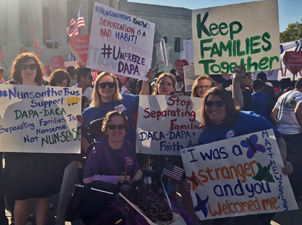
Dear Neighbor: Reflections on Service at the Border
Sr. Cecelia Cavanaugh, SSJ
July 29, 2021
As I finish unpacking my luggage after spending two weeks at the Texas-Mexico border, I find myself “unpacking” experiences, conversations, and my own emotions. As a word nerd, it did not seem an accident to me that the call to the border came on March 25, the feast of the Annunciation – God’s Word to Mary, Mary’s word to God, and the Word Made Flesh making a dwelling among us. As Sisters of Saint Joseph, we profess an active, inclusive love of every kind of dear neighbor from whom we do not separate or distinguish ourselves, just as Jesus was like us in all things but sin.
Many of us had responded last year to a similar invitation although we faced different realities since changes in administrative policies have (happily) resulted in a great influx in the number of persons found eligible to cross and seek asylum. I have been encouraged and lifted up by the support and enthusiasm of so many who cannot make the trip but want to help and want to know about the experience. Individual sisters, friends, and family members made donations, offered airport rides, babysat plants, covered home responsibilities, and corresponded often during our trips. Those returning from service offered perspective and advice to those preparing to go. Once home, I met a sister who left the morning for Laredo and passed on some tee shirts identifying us as Sisters of Saint Joseph, Hermanas de San José, bearing a motto, “Love Boldly.” I felt that I was passing a baton in a relay. We have scheduled zoom meetings so that border volunteers can share their experiences with our Sisters and Associates in Mission. We like to say, “where one of us is, we all are,” and that is absolutely my experience.
My service included using Spanish, which eased some interactions, provided, I hope, some support to our dear neighbors, and opened me to worlds of story, anguish, humor, extra rations of smiles and tears. The word nerd in me reveled in the rich variety of language I met – a reflection of dialects and indigenous influences in each country from which people had emigrated. Folks standing in line helped translate Spanish with Spanish, creating community. I learned five new words for “baby bottle,” for example, and that “calcetas,” a word I knew to mean “shackles” is used in some countries to mean “socks.”
Two linguistic encounters have stuck with me. Time after time, as I worked a line for clothing distribution or a counter where we provided hygiene items, baby supplies, and some over-the-counter medications, people made the same request. ¿Me regala. . .? They were asking for me to give them something. But instead of the verb I expected, “dar,” to give, they consistently used “regalar,” to gift.
I’ve since learned that in some countries, regalar is used interchangeably with dar. Regalar can mean to give away – which we were certainly doing. Why did it strike me so forcefully? Why did it stick with me? I think at first, it struck me in its humility and as a way of lowering oneself. “Would you gift me….” implies that the giver is somehow superior to the receiver and I resisted that notion. Secondly, nothing these dear neighbors were requesting was anything other than an essential of life: milk and a sippy cup for a toddler, diapers, diaper rash ointment, soap, shampoo, one change of clothes. This shone a bright, uncomfortable light on my abundance. I knew from firsthand experience that everything we had to give had been purchased with donations. I was a mere vehicle through which generous people offered help to others. I wasn’t gifting or giving anything on my own. The necessities of life are gifts from God, of course – but they shouldn’t be gifts for some and everyday abundance for others. This calls me to continue to examine how I consider what I have in light of what others need. If I make do with less (hardly a sacrifice), could my sister from Honduras have enough to feed and clothe herself and her children?
The second phrase which was new to me was, “Simplemente.” Literally, “simply,” my new friends used it as we ended our conversations. Can I offer you anything else? Would you like some other item? A smile and “Simplemente,” meant they had “enough.” When “simply” means “enough,” no one wants for anything. I’m sure you can tell that instead of just sharing the fruits of so much generosity with my dear neighbors, they are the ones who gifted me with new questions. I continue to have a deep sense that the little time I spent with them and the small plastic grocery bag of supplies we provided are paltry in light of need. When I feel underwhelmed considering what I offered in light of what they need and all to which they have every right as God’s children, they console me with their sweet smiles and “Simplemente.”
Read more from Sr. Cecelia: Called to Serve Our Neighbors at the Border
Cecelia J. Cavanaugh SSJ is a Sister of Saint Joseph of Philadelphia and a former Nun on the Bus.







